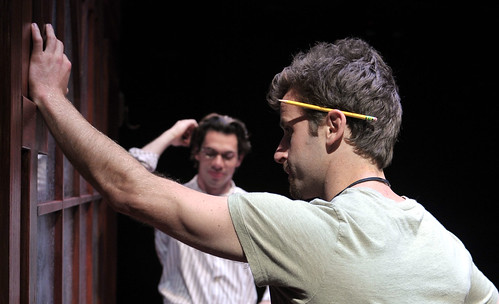Guest critic Leslie Ribovich reviews `Busy World’
As a critic at the Oakland Tribune and its sister newspapers, one of my greatest pleasures was instituting a teen theater critic internship, and it was my luck to launch the program with Leslie Ribovich, who was then a senior at Albany High School. For much of her final year in high school, she would accompany me to shows and write her own reviews, which than ran in the newspaper or online (or both).
Well, Leslie has finished her freshman year at a prestigious New York college, and while she's home this summer, I asked and she graciously accepted my offer to be a Theater Dogs guest critic. It is my pleasure to present her work. (For my review of the show, click here.) She remains an astute observer and a wonderful writer.

Aurora's Busy World Provokes Thought of Biblical Proportions
By Leslie Ribovich
You could label The Busy World is Hushed, currently at Aurora Theatre Company, as a political play with a strong message about the Episcopal Church's relationship with homosexuality, but the designation would be misleading. Yes, the characters grapple with God and predestination, and yes, two of them are homosexual, in a church no less, but playwright Keith Bunin presents the issues far too complexly to take sides.
In a political play, you look for the point of view. In this play, it's fragmented. We see three different points of view and wonder with whom the playwright agrees.
Is it Hannah (Anne Darragh) who has the first and last line of the play (often an indicator of point of view)? Hannah is an Episcopalian minister and seminary professor who is amazed by the idea that an infant could be the most powerful being, but also refers to "doe-faced Jesus-freaks from the Midwest."
Or Brandt (Chad Deverman), an excellent writer with a dying father who is unqualified for the job of synthesizing Hannah's research on an unearthed gospel into writing?
What about Thomas (an incredibly charismatic James Wagner), Hannah's son named for the apostle, who heard gospels instead of bedtime stories and believes his mother is, "fully informed and yet swallows her own Kool Aid"?
What if all three of them say things that make a lot of sense? And then say things that we couldn't disagree with more?
We don't walk away from this play knowing what political stance the playwright is taking. That makes good political theatre because these issues aren't black and white. Religious affiliation and belief in God address a fundamental part of human existence. The play thrives in sticky territory that must be dealt with gracefully and honestly, which Bunin and director Robin Stanton do.
Without a political or religious agenda laid out for us, the audience must think about the issues. And what's theatre good for if it doesn't make you think at least a little?
Bunin's play is also satisfying dramatically. Hannah hires Brandt despite his inadequacies, (a move that more scatter-brained professor types could benefit from following). His religious views are in flux: the Bible was the first piece of writing that he "truly and consciously loved" and yet he questions whether religion is a desperate attempt to make death more bearable. He tells Hannah upfront that as a gay man, he feels at best queasy when faced with the church's attitude toward homosexuality.

Thomas enters the scene covered in animal blood and "dried crap" immediately after Hannah explains that she despises stained glass because it epitomizes the self-important nonsense of Christianity and makes a mockery of motherhood (one of Bunin's many clever juxtapositions). Thomas is happy when he notices Brandt "looking his way."
So we've got two characters hard at work on Hannah's book and the mysterious history therein; a romantic relationship with too many psychological and practical barriers to produce anything less than one big fight; and a mother/ son relationship with expectations of biblical proportions.
The heat is raised on the drama in certain scenes, even visually at the end of Act 1 when light designer Kurt Landisman goes for a Godlike, transcendent quality. The effect highlights the production's melodramatic elements more than creates a religious metaphor, but it certainly excites you for Act 2.
The set has elegant stained glass windows for Hannah to deconstruct, boxes of Thomas' deceased father's things, and enough piles of books that when Brandt comments, how innovative to have a library without shelves, we laugh.
A large window overlooks a slightly out-of-focus, black-and-white photograph of New York's upper west side. Set designer Eric E. Sinkkonen's choice might indicate that the discussions in the playing space are timeless; they are somewhat removed from the outside world. The text takes a while to identify where they are geographically, and we might in fact like to know less about the city outside the church. When Bunin mentions "The Strand" and "NYU," we wonder if the characters aren't believable enough to live in the more ambiguous, slightly out-of-focus world that Sinkkonen creates.
This is political theater where the specific represents the big picture, or at least gets us wondering about it. After all, the big picture is nothing if we don't understand how it affects people we know or can relate to. In The Busy World is Hushed, we do.
The actors are all fabulous – they've figured out the emotional nuances of their characters to a tee. I must say: after a year in New York, Bay Area theatre still tops my list. Even a show like this that shouldn't necessarily be the-best-thing-I've-seen-all-year, feels so much more organic than anything I saw in New York. Kudos to the Aurora for creating risky, thought-provoking theatre.
For information about The Busy World is Hushed visit www.auroratheatre.org